Suivi et évaluation
La plupart des défis liés au suivi et à l’évaluation, comme la quantité insuffisante d’investissements et le manque de capacités, ne sont pas spécifiques à l’assistance monétaire, mais ceux qui le sont concernent principalement le suivi des résultats des transferts non affectés. La flexibilité des transferts monétaires peut compliquer la définition d’indicateurs de résultats appropriés, qui pourraient impliquer un mélange d’indicateurs spécifiques au secteur et transversaux. En parallèle, il existe des limitations au moment de collecter des données précises sur la manière dont les transferts monétaires sont dépensés.
Les signataires du Grand Bargain se sont engagés à garantir que des mécanismes de suivi et d’évaluation pertinents des transferts monétaires soient en place, et à assurer une meilleure compréhension des coûts, avantages, impacts et risques de cette modalité par rapport à d’autres. En partant de cet engagement, le chantier du Grand Bargain sur les transferts monétaires a établi plusieurs points d’action, dont le développement d’indicateurs de résultats communs pour les transferts monétaires à usages multiples, et des indicateurs pour l’analyse de l’optimisation des ressources. L’analyse systématique de l’optimisation des ressources a été rendue difficile par plusieurs facteurs, dont un manque d’approches approuvées, le besoin en données sur les résultats en termes de qualité et le caractère intensif de l’analyse.
Priorités actuelles
Dans le cadre des engagements du chantier du Grand Bargain sur les transferts monétaires, le CALP Network a co-dirigé (avec l’USAID et CRS) la mise au point d’indicateurs de résultats des transferts monétaires à usages multiples. Le projet à tester est actuellement disponible en anglais, espagnol et français, via la bibliothèque.
Initiatives associées
Contenu présenté

Indicateurs de résultats des transferts monétaires à usages multiples : Projet final à tester
Guides et outils
Les indicateurs présentés dans ce document se concentrent sur les principaux objectifs des TMUM humanitaires et sur les résultats auxquels les transferts monétaires à usages multiples peuvent le plus fortement contribuer. (Par exemple, certaines interventions en TMUM visent à relier les personnes aux systèmes de protection sociale après la fin du TMUM; mais nous n’avons pas inclus...

Monitoring 4 CTP: Monitoring Guidance for CTP in Emergencies
Guidelines and Tools
This guidance provides a central resource to promote a common understanding of the most important monitoring considerations for humanitarian projects using cash transfer programming (CTP). The primary audience for this guidance is field-level practitioners, from organisations directly involved in the design, implementation, monitoring, and accountability of projects using cash and vouchers...

Cost-Efficiency Analysis of Basic Needs Programs: Best Practice Guidance for Humanitarian Agencies
Guidelines and Tools
The Efficiency, Effectiveness and Value for Money Sub-Workstream is pleased to share the final output on Cost-Efficiency Analysis of Basic Needs Programs: Best Practice Guidance for Humanitarian Agencies (attached).
Cost-efficiency analysis estimates the ratio of program costs to outputs created, allowing you to compare cost-per-output for programs which all produced the same output. Such...
Thematic lead
Contenu récent

Multi-purpose Cash Assistance in Lebanon – Impact evaluation on the well-being of Syrian refugees
Report
The two year study assessed the impact of MPC on the well-being of over 11,000 Syrian refugee households living in the Bekaa, North and Mount Lebanon. The study finds that most of the impact of MPC materializes in the long term (over 12 months), while limited impact materializes in the short term. The...

Webinar | Multi-purpose Cash Transfer and Child Protection: a case study (English and Spanish editions)
Webinar recording
Watch the webinar recording here. More information here. In 2018, with the support of OFDA and FFP, Save the Children implemented a multi-purpose cash transfer ‘Plus’ program in response to the influx of Venezuelan into Colombia. The program aimed at covering vulnerable household’s basic needs and...

COVID-19: A chance to empower citizens through social protection
Report
Billions of US$ are now being distributed to citizens by governments to stave off deteriorating economic impact and rising poverty from COVID-19. The unprecedented pandemic demands an unprecedented government response. More than 126 countries have already introduced or adapted social protection or labour...

CCD Ethiopia one-year in: Collaboration in reality
Report
Based on insights compiled from surveys and interviews conducted with members of the Ethiopian cash community and CCD (Collaborative Cash Delivery Network) members in January 2020, this report provides an overview of how CCD Ethiopia is working towards global and national objectives, takeaways for startup...

External Evaluation of SDC/HA Emergency Cash Pilot For Earthquake Affected Households in Bubq, Albania
Report
In November 2019, Albania was hit by a large earthquake with a magnitude of 6.4, causing 51 people to lose their lives and injuring 913 people. Around 47,000 additional people were directly affected by the earthquake. The Swiss Agency for Development and Cooperation (SDC) immediately deployed a rapid...
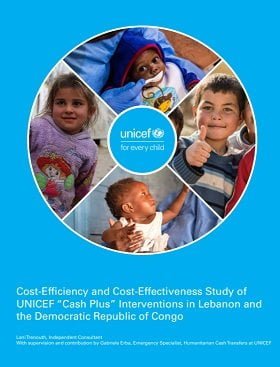
Cost-Efficiency and Cost-Effectiveness Study of UNICEF “Cash Plus” Interventions in Lebanon and the Democratic Republic of Congo.
Policy paper
The combination of basic services delivery and cash transfers is known among humanitarian practitioner as “cash plus”. This approach represents a solid comparative advantage for UNICEF considering its footprint in basic services delivery as well as its commitment to scale up humanitarian cash...

Somalia Cash Working Group (CWG) Monitoring Questionnaires
Guidelines and Tools
Baseline and Post-Distribution Monitoring questionnaires
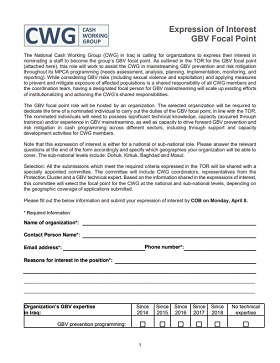
Expression of Interest GBV Focal Point
Policy paper
The National Cash Working Group (CWG) in Iraq is calling for organizations to express their interest in nominating a staff to become the group’s GBV focal point. As outlined in the TOR for the GBV focal point (attached here), this role will work to assist the CWG in mainstreaming GBV prevention and risk...
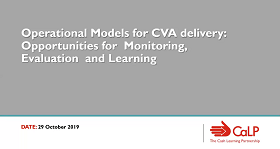
Monitoring, Evaluation and Learning: how to ensure efficiency, effectiveness and accountability
Blog Post
What are the key issues these and other emerging models are facing as they design to deliver better for people in crisis? What are the opportunities and challenges presented by working together differently?

Nigeria Capacity Gap Analysis
Case Study
Between 2009 and 2019, the Boko Haram insurgency has affected around 13.4 million people in North East of Nigeria. Out the total affected, around 7.1 million are in need of humanitarian assistance while 6.2 million are targeted for humanitarian assistance. To date, 1.8 million people are reported...

MEAL in Emerging Operational Models
Webinar

Multi-Purpose Cash Transfer ‘Plus’: Maximizing impact on children through integrated cash-based programming
Report
In 2018, with the support of OFDA and FFP, Save the Children implemented a multi-purpose cash transfer ‘Plus’ program in response to the influx of Venezuelan into Colombia. The program aimed at covering vulnerable household’s basic needs and prevent them from resorting to negative coping strategies,...
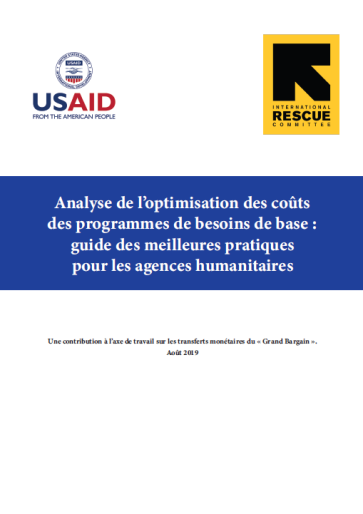
Analyse de l’optimisation des coûts des programmes de besoins de base : guide des meilleures pratiques pour les agences humanitaires
Guides et outils
L’objectif général de cette activité, et de ce document d’orientation en particulier, est « d’améliorer la capacité à réaliser une analyse rigoureuse et cohérente de l’optimisation des coûts dans l’assistance humanitaire ».
Pour ce faire, un document d’orientation technique sera...

How Cash-Based Approaches affect Nutrition Outcomes: Case Studies from World Vision cash programmes in Bangladesh and South Sudan
Report
Case studies South Sudan & Bangladesh – analysis of how different modalities meet their basic needs with flexibility and dignity, esp. contributing to improved nutrition outcomes. Factors such as spending patterns, availability of nutritious food in markets, dietary changes & coping strategies, transfer...

How Cash-Based Approaches Affect Nutrition Outcomes – Guidence Note
Guidelines and Tools
Based on the case studies from South Sudan and Bangladesh, this summary guidance provides advise on use of CVA for improved nutrition outcomes in vulnerable children, emphasising recommendations to ensure that:
– as part of design and targeting, there is improved consideration of nutrition needs in MEB...

The UN Common Cash Platform: What does it mean and how is the IRC responding?
Blog Post
Together our members and partners have strengthened the evidence base and advanced the debate around gender and cash and voucher assistance. Looking ahead, how can we ensure we turn talk into action to deliver quality CVA for everyone?
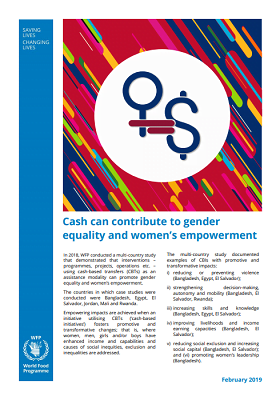
Cash Can Contribute to Gender Equality and Women’s Empowerment
Report
In 2018, WFP conducted a multi-country study that demonstrated that interventions – programmes, projects, operations etc. – using cash-based transfers (CBTs) as an assistance modality can promote gender equality and women’s empowerment. The countries in which case studies were conducted were...
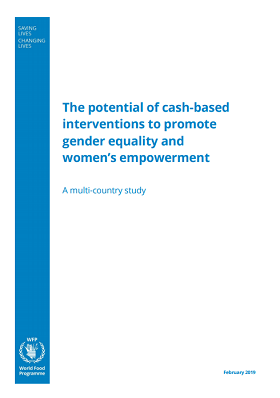
The Potential of Cash-Based Interventions to Promote Gender Equality and Women’s Empowerment
Report
The study on The Potential of Cash-Based Interventions to Promote Gender Equality and Women’s Empowerment sought to explore how CBIs can contribute to achieving gender equality and women’s empowerment (GEWE), as ends in themselves and for food security and nutrition outcomes. Where changes in GEWE...
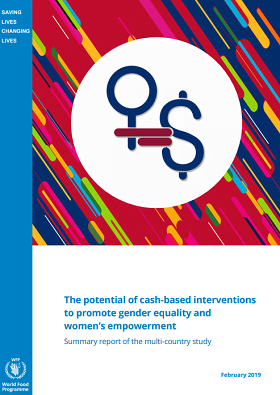
The Potential of Cash-Based Interventions to Promote Gender Equality and Women’s Empowerment – Summary Report of the Multi-Country Study
Report
The study on The Potential of Cash-Based Interventions to Promote Gender Equality and Women’s Empowerment sought to explore how CBIs can contribute to achieving gender equality and women’s empowerment (GEWE), as ends in themselves and for food security and nutrition outcomes. Where changes in GEWE...
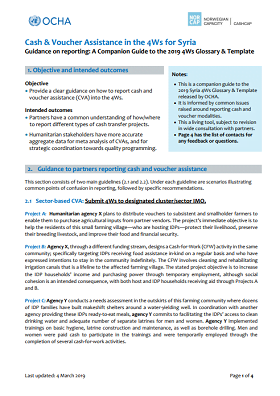
Cash & Voucher Assistance in the 4Ws for Syria Guidance on reporting: A Companion Guide to the 2019 4Ws Glossary & Template
Guidelines and Tools
Objective
• Provide a clear guidance on how to report cash and voucher assistance (CVA) into the 4Ws.
Intended outcomes
• Partners have a common understanding of how/where to report different types of cash transfer projects.
• Humanitarian stakeholders have more accurate aggregate data for meta...



